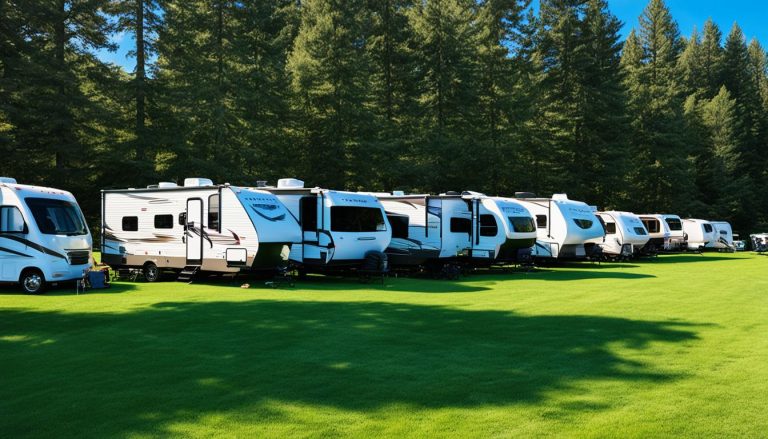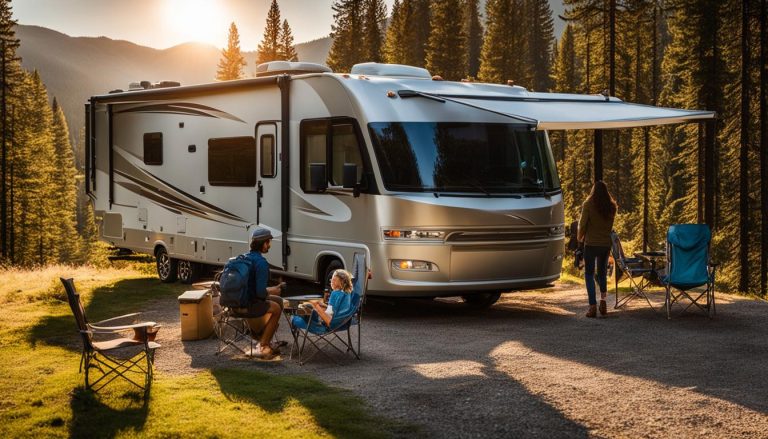RV Rental Return Policies: Smooth Drop-Off Tips
gorvlifestyle.com and its partners may earn a commission if you purchase a product through one of our links
Embarking on a journey through the scenic routes of America in a rented RV is an exhilarating experience, but what happens when the trip reaches its end? Understanding RV rental return policies is a critical part of the rental process that can ensure a smooth return experience. Familiarizing oneself with the essentials—from interior cleanliness to timely drop-offs—avoids the hustle of last-minute surprises and helps to guarantee a hassle-free drop-off. The goal is to help renters navigate the nuances of return requirements, transforming the daunting task of RV return into an effortless closure to their adventure.
Key Takeaways
- Fully grasp RV rental return policies to avoid additional charges and ensure a seamless return.
- Clean the RV’s interior before drop-off to maintain the vehicle’s condition and avert cleaning fees.
- Refill fuel tanks and manage waste disposal to meet rental return obligations.
- Plan the drop-off time meticulously to adhere to schedules and prevent late return fees.
- Conduct a final inspection, taking care to return all items, for a stress-free handover.
- Achieve a successful RV rental adventure conclusion by abiding by all detailed return instructions.
Understanding the Basics of RV Rental Return Policies
The allure of traversing the vast American landscapes in a home-on-wheels is an unmatched experience. However, as the journey concludes, it is paramount for travelers to be well-informed of the RV rental return policies. These protocols are designed to ensure the rental RV is returned in an acceptable condition, safeguarding the interests of both the renter and the rental company. Such policies typically cover the specifics of the RV return process, outlining the renter’s responsibilities towards the vehicle’s condition, fuel, and waste management, and the safe return of all accessories provided.
Rental providers expect certain obligations to be met which are often clearly articulated in the rental agreement. To streamline the understanding of these expectations, here’s an insightful breakdown:
- Interior Cleanliness: The RV should be returned with the interior cleaned, free of trash, and with surfaces wiped down.
- Fuel and Waste Tanks: Tanks should be returned at the appropriate levels as stated in the agreement — typically full for fuel and emptied for waste.
- Rental Equipment: Any additional equipment that was rented with the RV must be returned in the same condition it was provided.
By diligently adhering to these rental RV obligations, renters can circumvent potential penalties and foster a professional rapport with the rental company. This is integral not only to avoid financial inconveniences but also to maintain a commendable rental history, which could benefit future vehicle rentals.
It is the renter’s responsibility to conduct a thorough review of the return policies prior to embarking on their adventure. This includes documentation of the RV’s initial state to ensure a transparent comparison upon return. A well-documented, clear understanding of the required conditions can make the difference between a swift return process and one mired in disputes over additional charges.
For both seasoned travelers and those new to the RV experience, respecting these guidelines can pave the way for many more joyous and untroubled journeys across the scenic roads of the United States.
Preparing for Your RV Return: What to Expect
When the time comes to bring your adventure on the road to a close, preparing your RV return is critical to ensure a smooth transition. Familiarize yourself with the necessary steps to leave the camper in prime condition, avert any additional charges, and part ways on good terms with your rental company.
Accentuating RV Interior Cleanliness
It’s not just about picking up trash; camper interior cleanliness goes a long way in safeguarding your deposit and maintaining a respectful rapport with the rental service. Sweeping floors, wiping down surfaces, and sanitizing the bathroom and kitchen areas can mirror the condition of the RV at pick-up and set a high standard for your rental record.
- Vacuuming carpets and seating
- Scrubbing all kitchen appliances
- Cleaning windows and mirrors
- Disposing of all garbage
Managing Waste Disposal Before Drop-Off
Effective waste disposal management is a non-negotiable aspect of the RV experience. Locate designated stations and ensure you’ve emptied and rinsed both the gray and black water tanks. This step not only aligns with environmental considerations but is a testament to your conscientiousness as a renter.
- Emptying gray water tanks
- Clearing black water tanks
- Rinsing and sanitizing tanks after disposal
Ensuring a Full Fuel Tank for Return
As a final act of courtesy and contract adherence, remember to refill the fuel tank. This step should not be overlooked; driving the extra mile to a fuel station can save you from service fees and illustrates a thorough, responsible approach to preparing for RV return.
- Finding the nearest gas station to the drop-off point
- Refilling to the original level or beyond
- Keeping receipts if required by the rental company
By following these key steps—focusing on cleanliness, waste management, and fuel top-off—you’ll not only avoid any unnecessary costs but also etch a reputation as a reliable and clean renter, paving the way for future road trip adventures in the comfort of an RV.
RV Return Terms and Costs Associated with Late Returns
Understanding the RV return terms is essential to avoid unexpected, often costly, complications such as camper return costs and late RV return fees. Most rental companies have a fixed schedule for RV returns, and failure to comply with these timings can have financial repercussions. Let’s delve into what you might expect if you return an RV later than agreed upon.
Timeliness is key. Ensure you plan your trip with the rental company’s schedule in mind to sidestep any unwelcome late return fees.
Renters should always be clear about the potential costs involved with late returns. Here’s a breakdown of typical fees that could arise:
- Basic Late Fee: A flat rate charged for any return past the scheduled time.
- Incremental Charges: Additional costs that accrue for every hour or day beyond the return deadline.
- Extended Rental Rate: In some cases, keeping the RV past the return time might incur extra day rental fees at a rate different from the original agreement.
To avoid misunderstandings and the strain of late RV return fees, make sure to review the rental agreement thoroughly before hitting the road. Planning for possible delays and allocating sufficient time for the return journey can save renters from the hassle and expense of straying from the agreed RV return terms.
Remember, maintaining a good relationship with your rental service isn’t only about curtailing costs—it also sets the stage for a smoother rental experience in your future adventures.
RV Rental Return Policies: Navigating Mileage and Fuel
When planning an RV journey, travelers not only revel in the excitement of the open road but must also be cognizant of the rental company’s return policies, particularly regarding mileage and fuel. Key components such as RV return mileage fees and motorhome fuel policies can have a significant impact on the overall rental cost and require careful attention to avoid any surprises at the end of a delightful trip.
Analyzing Mileage Fees Under RV Return Terms
To ensure a clear understanding, renters should familiarize themselves with the RV rental requirements that delineate the acceptable mileage use. Many RV rental companies allot a certain number of miles per day or per trip and levy charges for any miles driven beyond this allowance. Investigating the specific terms can aid travelers in calculating the potential costs and planning their route accordingly.
Fuel Refill Policies for Motorhome Rentals
Adherence to the rental company’s fuel policy is equally crucial. It’s standard for companies to require travelers to refill the fuel tank to the same level as when they received the motorhome. To avoid additional fees, it’s advisable to refill close to the drop-off location, ensuring the fuel gauge accurately reflects the agreed starting level.
Below is a summary of potential RV return considerations that could affect your post-adventure budget:
| Mileage Policy | Standard Allowance | Excess Mileage Fee |
|---|---|---|
| Daily Allowance | 100 miles/day | $0.35 per additional mile |
| Total Trip Allowance | 1,000 miles/trip | $0.35 per additional mile |
| Fuel Policy | Refill Requirement | Refueling Service Charge |
|---|---|---|
| Full-to-Full | Return with full tank | N/A |
| Same-to-Same | Return at pick-up level | $5 plus fuel cost |
A thorough appraisal of these policies before you hit the road can lead to a more economical and stress-free RV experience. Ensure to keep this information handy, and consider integrating these essential factors into your trip’s budgeting and itinerary planning.
Strategies to Avoid Additional Charges at RV Drop-Off
Renting an RV for a road trip adventure can come with its own set of challenges, especially when the time comes to return the vehicle to the rental company. One area RV renters regard with caution is the potential for unforeseen additional charges at drop-off. To alleviate these concerns, it’s strategic to adhere to a comprehensive RV drop-off checklist, which ensures both the rental company’s and renter’s interests are protected. Here are some steps renters can take to prevent incurring additional fees.
First and foremost, documenting the condition and contents of the RV both before and after the journey is a crucial step. This can serve as proof that the renter is returning the RV in the same condition as when it was first rented. Additionally, meticulous cleaning, both inside and out, can help prevent cleaning fees. It’s also essential to confirm and document that the RV has been returned with the same level of fuel as when it was picked up to evade any refueling charges.
| Action | Purpose | Outcome |
|---|---|---|
| Document initial & final conditions | To have evidence of the RV’s state to refute any damage claims | Avoidance of damage charges |
| Thorough interior & exterior cleaning | To meet the cleanliness standards set by the company | Prevention of cleaning fees |
| Ensure all items are returned | To verify that nothing rented is missing | Avoidance of charges for lost items |
| Full fuel tank | To match the fuel level at the time of pick-up | Prevention of refueling charges |
Checking off the items on the RV drop-off checklist can ease the return process and protect from unforeseen expenses. Effective strategies like these are not only good practice, but they cultivate trust between the renter and the rental company. Renters who avoid additional RV charges ensure a conclusion to their travel that’s as enjoyable as the journey itself.
The Importance of Timely Returns and Adhering to Schedules
When it comes to RV rentals, the adage “time is of the essence” takes on a literal meaning. The expectation for timely RV returns plays a pivotal role in the rental process, and both rental companies and customers need to be acutely aware of the stipulated return schedules. Compliance with these timelines is not just a sign of good etiquette; it is a contractual requirement that can carry financial consequences if overlooked.
Penalties for Delays in Camper Return Regulations
Failure to return an RV on time can lead to penalties, often in the form of late fees that accumulate rapidly, creating an unexpected additional expense for the renter. Rental companies impose these penalties for delayed returns as a way to manage their inventory and ensure that the next customer receives their vehicle as scheduled.
Scheduling and Planning for On-Time RV Returns
To mitigate the risk of these late return penalties, careful scheduling and planning are key. Renters are encouraged to frame their travel itineraries with a conservative time buffer. This foresight not only allows for the unexpected occurrences that can delay travel but also provides renters with the peace of mind that comes with knowing they have ample time to adhere to their return schedules.
Mindful travelers often take proactive steps to avoid these charges by:
- Scheduling their return well before the deadline.
- Keeping rental companies informed of any changes in travel plans.
- Making allowance for cleaning and refueling the RV prior to return.
As such, sticking firmly to the agreed return times is of mutual benefit. Rental companies can efficiently manage their fleets and customers can enjoy a smooth and cost-effective return process.
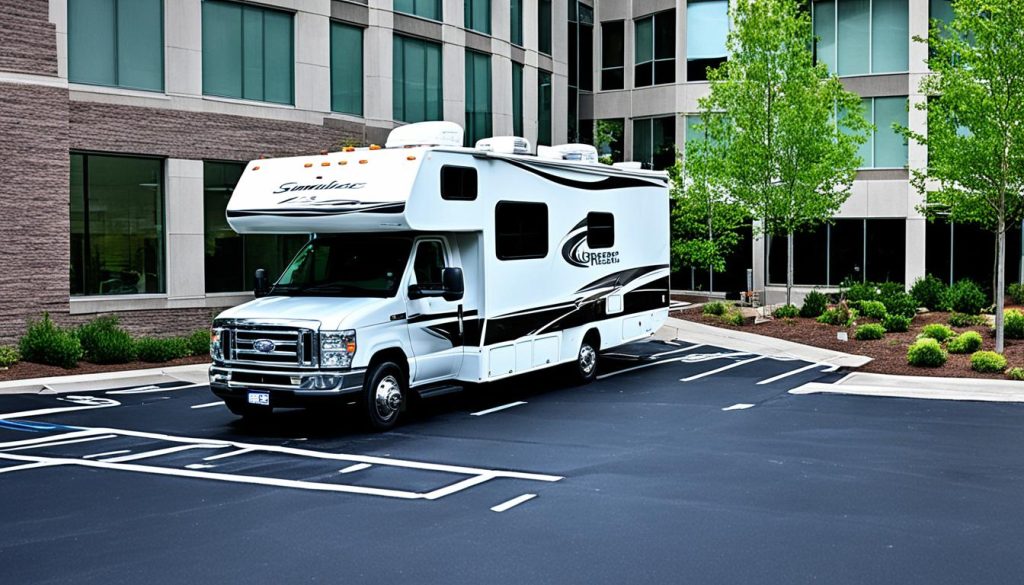
Below is a table detailing common penalties and associated costs that can be incurred if a renter fails to return the RV within the agreed-upon timeframe:
| Duration of Delay | Penalty | Additional Costs |
|---|---|---|
| 1-2 hours | Minor Late Fee | Varies by company |
| 2-4 hours | Increased Late Fee | Potential loss of deposit |
| 4 hours+ | Severe Late Fee | Cost equivalent to an extra day’s rental |
Recognizing the significance of adhering to return schedules can forestall such penalties for both occasional travelers and frequent renters. Moreover, it upholds the integrity of the rental process, contributing to a more trusting and reliable rental market.
Expectations for Vehicle Condition: Camper Return Regulations
Renter responsibility and mindful rental RV care are at the forefront of achieving a smooth return process. Vehicle condition expectations are not merely a formality but essential conditions set by camper return regulations that reflect on a renter’s consideration for the rented automobile and future rental privileges. A seamless return is underpinned by the renter meeting specific criteria regarding the vehicle’s condition.
Before returning the RV, your rental agreement may require you to restore the vehicle’s condition to its pre-trip state. This includes attending to both the interior and exterior cleanliness, ensuring all systems and appliances are fully functional, and confirming there is no damage beyond normal wear and tear.
Compliance with the established camper return regulations not only helps in avoiding extra costs but underlines a sense of respect and value for the property rented. To facilitate a deeper understanding, highlighted below is a detailed breakdown of expectations:
- Cleaning: All surfaces, both inside and out, should be thoroughly cleaned, with no trash or personal items left behind.
- System Check: Electrical, plumbing, and HVAC systems require a routine check to guarantee they are in working order.
- Damage Check: Performing a walk-through to spot any damage incurred during the trip is crucial. Record and report any findings.
- Inventory Control: Ensure all items that were included in the rental are accounted for and in their rightful place.
| Checklist Item | Status Before Rental | Expected Status at Return | Notes |
|---|---|---|---|
| Cleanliness | Immaculate | Immaculate | Renter must clean or pay for cleaning services. |
| Gas Tank | Full | Full | Includes propane and gas tanks. |
| Waste Disposal | Empty and clean | Empty and clean | Particularly grey and black water tanks. |
| Inventory | All items present | All items present | Replacement costs for missing items. |
To conclude, abiding by the rental RV care and return standards is fundamental to concluding your roaming residence experience on a positive note. It encapsulates the essence of respect for both the rented asset and your adventuresome spirit.
Insights into Motorhome Rental Requirements at Drop-Off
At the final stage of a motorhome adventure, renters are faced with various motorhome rental requirements to ensure a smooth and compliant drop-off process. Understanding these requirements ahead of time eases the transition and helps avoid any last-minute complications.
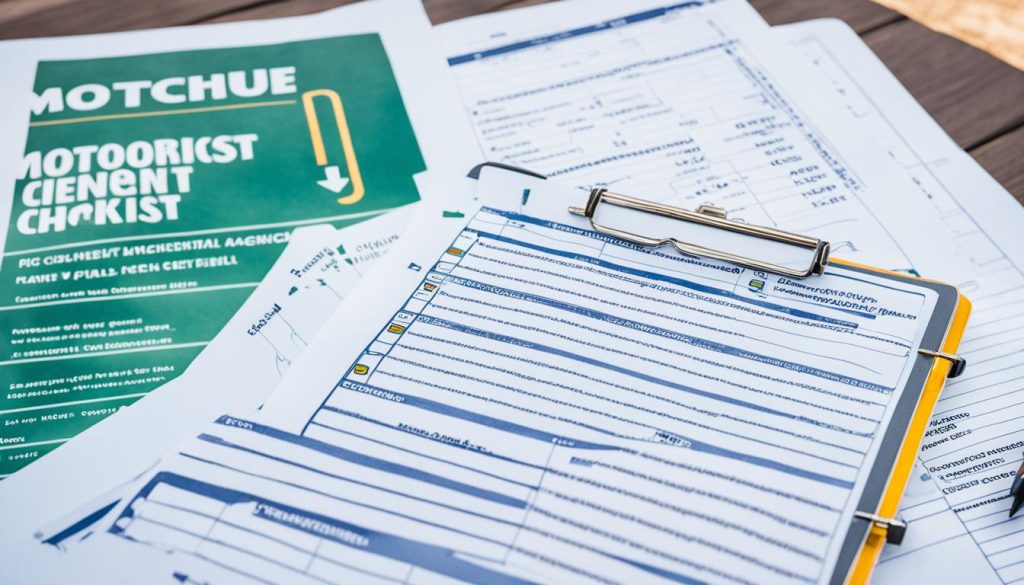
Securing and Submitting Rental Documentation
One critical step during the drop-off process involves securing and submitting all pertinent rental documentation. This documentation typically encompasses contracts, insurance papers, and any additional agreements that were a part of the rental setup. To avoid any disputes or delays, it is advisable for renters to organize these documents well in advance, guaranteeing that nothing is overlooked.
Inspection Checklists Prior to RV Return
Another pivotal requirement concerns the physical condition of the vehicle upon return. Employing a comprehensive inspection checklist enables renters and rental companies alike to assess any discrepancies between the RV’s initial and final state. This checklist often covers aspects such as cleanliness, equipment inventory, and mechanical functionality, and helps both parties maintain transparency.
| Item | Description | Status (Good / Needs Attention) |
|---|---|---|
| Exterior | Assessment of bodywork for scratches or dents | |
| Interior Cleanliness | Checking for spills, stains, and general tidiness | |
| Appliance Function | Verification that all onboard appliances are operational | |
| Equipment Inventory | Audit of all additional equipment provided at pickup | |
| Fuel Level | Confirmation of fuel refill to the agreed level |
Consequences and Solutions for Rental RV Key Loss
In the eventuality of an RV key loss, the renter needs to promptly notify the rental company. Timely communication is essential as it allows for swift action to be taken, whether that involves key replacement or a change in the vehicle’s locks. It is crucial to recognize that such scenarios can incur additional costs, which the renter should anticipate as a responsibility.
By keeping these key points in mind—submission of documentation, thorough completion of the inspection checklist, and a plan of action in case of key loss—renters can confidently meet all motorhome rental requirements and conclude their journey on a positive note.
Trailer Return Guidelines: The Final Check Before Handing Over the Keys
As the conclusion of your RV rental approaches, it’s crucial to adhere to the trailer return guidelines to ensure a seamless rental drop-off experience. This final phase is pivotal as it signifies the end of your road journey and the beginning of transition responsibilities back to the rental agency.
A final RV check entails a meticulous walkthrough, where every detail from the checklist provided by the rental company is verified. Cleaning procedures must be executed according to the company’s standards, resembling the condition upon pick-up as closely as possible. Items such as cleaning supplies, maintenance tools, and personal belongings should be inspected with keen attention to detail.
To comply with the established rental drop-off protocol, renters should ensure that the fuel tank is refilled to the level specified in the rental agreement. Overlooking this step could lead to additional charges which can be easily avoided with proper planning.
Beneath is a detailed checklist table to aid in your final RV check. It serves to ensure nothing has been missed before you proceed with handing over the keys to the rental company.
| Checklist Item | Description | Status (Complete/Incomplete) |
|---|---|---|
| Interior Cleanliness | Removal of trash, wiping surfaces, vacuuming floors, and cleaning the bathroom. | Complete |
| Exterior Maintenance | Checking for any damages, ensuring lights and tires are functional. | Complete |
| Inventory Check | Verification of all rented items such as kitchenware, electronic devices, and additional gear. | Complete |
| Fuel Level | Refilling the tank to the pre-rental level or as per rental agreement. | Complete |
| Documentation | Ensure all rental agreements, manuals, and related documents are in the RV. | Complete |
Once all items are checked and verified, it is essential to conduct a final walkthrough with a representative from the rental company. This ensures that both parties agree on the vehicle’s condition and can jointly sign off on the condition report.
Following a structured trailer return process not only facilitates a stress-free end to your rental experience but also fosters trust and confidence with your rental agency, setting the stage for future road adventures.
Essential Tips for a Stress-Free Camper Drop-Off
Returning your rental RV in the ideal rental return condition is paramount to ensuring a stress-free camper drop-off. Preparation leads the way by reducing risks of unforeseen charges and securing your deposit. Below are rental RV tips that promise a smooth transition as you wrap up your traveling escapades.
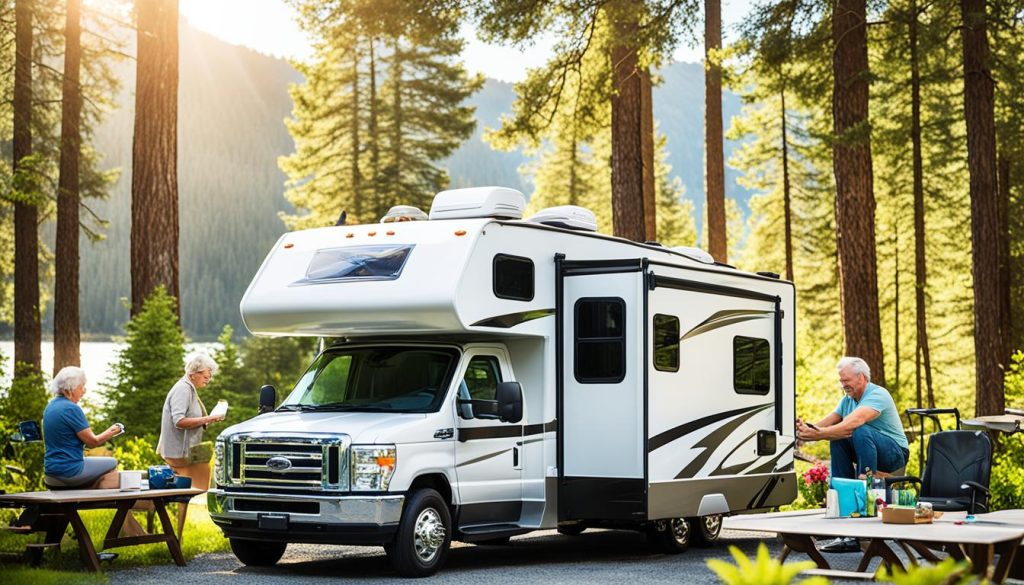
Interior Cleanliness: Leave no trace behind. A clean interior is a cornerstone of the return process. Vacuum or sweep floors, wipe down surfaces, and ensure all kitchen equipment is spotless.
Fuel Level Check: Fill up the tank before you arrive at the drop-off point. Matching the fuel level to what was agreed upon in the rental agreement avoids the hassle and extra costs.
Pre-Return Inspection: Conduct a thorough inspection of the RV, both inside and out. Address any damage and gather photographic evidence for transparent discussions with the rental company.
Adherence to Guidelines: Abide by the rental company’s policies on pet allowance, non-smoking rules, and the proper disposal of waste.
For a quick reference, the table below summarizes the key responsibilities to tick off before handing over the keys:
| Task | Checklist Item | Impact on Drop-Off |
|---|---|---|
| Cleaning | Interior tidying and surface cleaning | Prevents cleaning charges |
| Fuel | Refueling to pre-rental level | Avoids refueling fees |
| Inspection | Photographic evidence of RV condition | Facilitates transparent damage assessment |
| Policy Compliance | Following all rental terms and conditions | Ensures full deposit return |
Remember, diligent preparation not only sets the stage for a stress-free camper drop-off but also fortifies a positive relationship with the rental company, paving the way for future adventures on the road.
Conclusion: Bringing Your RV Rental Adventure to a Successful End
As the sun sets on your RV rental adventure, the final chapter involves a process that encapsulates the essence of a thoughtful renter: the successful RV return. It’s the period when the exhilaration of the open road meets the responsibility of wrap-up. Diligently adhering to the rental company’s policies regarding interior cleanliness ensures that the next traveler will find the RV ready for the road. Timeliness, as with all good things, is not just about avoidance of additional fees, but a reflection of courtesy and good planning. And when it comes to the maintenance of rental documents and keys, prudence is paramount in avoiding any last-minute hiccups.
All these actions, when executed with attention to detail, foster a seamless RV rental journey conclusion. It’s not simply about ending the trip but doing so in a way that upholds the standards set forth at the outset. Renters who embrace these principles are often met with a hassle-free return, strengthening their reputation with rental companies, and paving the way for future adventures on the vast American roads.
Ultimately, the measure of a successful RV rental does not rest solely on the sights seen or the miles traversed. It is also captured in the last impressions left with the rental company and the peace of mind it brings. By ensuring that each step of the drop-off checklist is completed with care, renters can look back on their journey with gratification, knowing that they have concluded their travels as model stewards of the roaming homes that carried them through it all.

